Wolverton Station Read online
Page 3
The conductor said something in a choked, wolfish voice on the intercom, but Saunders couldn’t hear him over what his own wolf was saying to him and above the roar of blood in his ears. But he didn’t need to hear the conductor anyway, because Saunders knew what he was saying. They had arrived at the station at last. The train was slamming ungently to rest. Saunders grabbed the seat in front of him and lurched to his feet. Outside, he had a glimpse of a concrete platform, a brick breezeway, a glowing old-fashioned clock stuck up on the station wall. He began walking swiftly for the front of the car.
“ ’Ey,” laughed the wolf. “Don’t you want your coat? Come on back and get it.”
Saunders kept walking. He reached the door at the end of the cabin in five long strides and hit the DOOR OPEN button. The wolf barked a last laugh at Saunders’s back, and Saunders dared a final glance over his shoulder. The businesswolf was disappearing behind his paper once more.
“Microsoft shares are down,” the wolf said, in a tone that somehow combined disappointment with a certain rueful satisfaction. “Nike shares are down. This isn’t a recession, you know. This is reality. You people are finding out the actual worth of the things you make: your sneakers, your software, your coffee, your myths. You people are finding out now what it’s like when you push too far into the deep, dark woods.”
Then Saunders was out the door and on the platform. He had thought it was raining, but what came down was more of a weak, cold mist, a fine-grained moisture suspended in the air. The station exit was across the platform, a flight of stairs to the road below.
He had gone no more than five paces before he heard loud, derisive yipping behind him and looked back to see two wolves descending from coach. Not the wolves in suits but the one in the Wolfgang Amadeus T-shirt and the other dressed for a Manchester United match. Manchester United clapped Wolfgang on the shoulder and jerked his snout in Saunders’s direction.
Saunders ran. He had been fast once, on his track team in high school, but that had been fifty years and five thousand Whoppers ago. He didn’t need to look back to know they were behind him, loping across the concrete, and that they were faster than him. He reached the staircase and leaped down it, three, four stairs in each step, a kind of controlled falling. His breath screamed in his throat. He heard one of the wolves make a low, purring growl at the top of the stairs. (And how could they be at the top of the stairs already? It wasn’t possible that they could’ve closed so much distance so quickly, it wasn’t.)
At the bottom of the steps was the line of gates, and the street beyond, and a taxi waiting, a black English taxi straight out of a Hitchcock movie. Saunders picked a gate and ran straight at it. The gates: a row of chrome dividers, with waist-high black Plexiglas shutters between them. You were supposed to stick your ticket into a slot on the top of the chrome dividers and the shutters would swing open, but Saunders wasn’t going to fuck with it. When he reached the Plexiglas shutters, he went right over them, in a graceless scramble, followed by a tumble to the ground.
He sprawled onto his stomach, facedown on the rain-spattered concrete. Then he was up again. It was like a skip in a piece of film, so it hardly seemed he had gone down at all. He had never in his life imagined he could recover so quickly from a spill.
Someone yelled behind him. Every set of gates in every train station in the UK had an officer to watch over them and take tickets manually, and Saunders thought this had to be who that was. He could even see him out of the corner of his left eye, a guy in an orange safety vest, white-haired and bearded. Saunders didn’t slow down or look over. A joke floated unbidden to his mind: Two hikers in the woods come across a bear. One of them bends over to lace his sneakers. The other hiker says, “Why tie your sneakers? You can’t outrun a bear.” And the first hiker says, “No shit, asshole. I only need to outrun you.” Pretty funny. Saunders would remind himself to laugh about it later.
He fell against the back of the taxi, clawed for the door lever, found it, popped it open. He collapsed into the black leather seat.
“Go,” he said to the driver. “Go.”
“Where are we—” said the driver, in the thick accent of western England.
“Town. Into town. I don’t know yet, just go. Please.”
“Right then,” the driver said. The taxi loosened itself from the curb and pushed off down the avenue.
Saunders twisted in his seat to look out the rear window as they left the train station. Manchester United and Wolfgang Amadeus had stopped at the gate. They crowded around the ticket taker, towering over him. Saunders didn’t know why the ticket man just stood there staring back at them, why he didn’t recoil and run, why they didn’t fall on him. The taxi carried him around the corner and out of sight of the station before he could see what happened next.
He sat in the darkness, breathing fast and hard, incredulous at his own survival. His legs shook, the big muscles in his thighs bunching up and uncoiling helplessly. He had not shaken the whole time he was on the train, but now it was as if he had just climbed out of an ice bath.
The cab glided down a long, gradual hill, past hedges and houses, dipping toward the lights of a town. Saunders found one of his hands feeling in his pocket for the cell phone he knew he didn’t have.
“Phone,” he said, talking to himself. “Damn phone.”
“Need a phone?” said the driver. “I’m sure there was one at the station.”
Saunders glanced at the back of the driver’s head, peering at him in the dark of the car. A big man with long black hair tucked down into the collar of his coat.
“There wasn’t time to stop and make a call there. Just take me to someplace with a public phone. Someplace else.”
“There’s one at the Family Arms. That’s only a couple blocks.”
“Family Arms? What’s that? Pub?” Saunders’s voice cracked, as if he were a fourteen-year-old in the throes of puberty.
“Best’un in town. Also the only’un. But if I’d known that’s where you wanted me to drive you, I wouldn’t have taken the fare. It’s easier walking, see?”
“I’ll pay you triple your usual rate. I’ve got plenty of money. I’m the richest man that’s ever sat in this fucking cab.”
“Isn’t this my lucky day,” said the driver. The ignorant country moron had no idea Saunders had just almost been torn apart. “So what happened to your regular chauffeur?”
“What?”
Saunders didn’t understand the question; in truth, he hardly registered it, was distracted. They had stopped at a light, and Saunders happened to look out the window. Two teenagers stood necking on the corner. They had a couple dogs with them, who stood at their sides, whisking their tails nervously back and forth, waiting for the kids to get done kissing and start walking again. Only there was something wrong with those two kids. The taxi was moving again before Saunders figured out what it was. Those tails, fretfully whisking from side to side—Saunders hadn’t actually spotted the dogs attached to them. He wasn’t sure there had been any dogs there at all.
“Where is this?” Saunders asked. “Where am I? Is this Foxham?”
“We isn’t anywheres near Foxham, sir. Upper Wolverton, this is,” said the driver. “Which is what they call it because ‘The Middle of Nowhere’ don’t sound as good. Edge of the known world, really.”
He eased the cab to the end of the next block and swung in at the curb. There was a pub on the corner, big plate-glass windows, bright squares of gold in the darkness, steamed over with condensation on the inside. Even shut into the backseat of the cab, Saunders could hear the noise from within. It sounded like an animal shelter.
A small knot of people loitered outside the front door. A carved and painted wooden sign, bolted to the stone beside the door, showed a crowd of wolves standing on their hind legs gathered around a table. In the center of the table was a great silver platter, with
an assortment of pale human arms laid upon it.
“Here you go,” said the cabdriver, turning his head to look into the rear. His snout moved close to the glass that separated the front seat from the back and breathed a filmy white mist on it. “You can make your call here, I ’spect. Have to fight your way through a bit of a crowd, I’m afraid.” He made a low chuckling sound that Saunders supposed was meant to be laughter, although it sounded more like a dog trying to cough up a hairball.
Saunders did not reply. He sat in the black leather seat, staring at the crowd outside the door of the Family Arms. They were staring back. Some of them were walking toward the cab. Saunders decided not to make any sound when they pulled him out. He had learned in Kashmir how to hold on to silence, and if he was strong, he would only need to hold on to it for about a minute and a half, and then it would be holding on to him.
“Good little mum-and-pop place, this is,” his driver told him. “They serve up a right fine dinner in here, they do. And you know what, mate? I think you’re just in time for it.”
AUTHOR’S NOTE
Note: The first draft of “Wolverton Station” was written entirely while I was riding English trains—the first part on the rails from London to Liverpool, the second while en route from Liverpool to Manchester, and the conclusion on the Manchester–Nottingham line. The author wishes to thank the people of England for not devouring him while he toured their country.
—Joe Hill, April 15, 2010
ABOUT THE AUTHOR
Joe Hill is the New York Times bestselling author of the novels NOS4A2, Horns, and Heart-Shaped Box, and the prizewinning story collection 20th Century Ghosts. He is also the Eisner Award–winning writer of an ongoing comic book series, Locke & Key. You can learn more at www.joehillfiction.com, or follow Joe on Twitter, where he goes by the inspired handle of @joe_hill.
Visit www.AuthorTracker.com for exclusive information on your favorite HarperCollins authors.
ALSO BY JOE HILL
NOS4A2
Horns
Heart-Shaped Box
20th Century Ghosts (story collection)
Graphic Novels
Locke & Key, Volumes 1–6
with Gabriel Rodríguez (IDW Publishing)
CREDITS
Cover design and illustration by Adam Johnson
COPYRIGHT
This is a work of fiction. The characters, incidents, and dialogue are drawn from the author’s imagination and are not to be construed as real. Any resemblance to actual events or persons, living or dead, is entirely coincidental.
“Wolverton Station” originally appeared in Subterranean: Tales of Dark Fantasy, April 2011, published by Subterranean Press.
WOLVERTON STATION. Copyright © 2011 by Joe Hill. All rights reserved under International and Pan-American Copyright Conventions. By payment of the required fees, you have been granted the nonexclusive, nontransferable right to access and read the text of this e-book on-screen. No part of this text may be reproduced, transmitted, downloaded, decompiled, reverse-engineered, or stored in or introduced into any information storage and retrieval system, in any form or by any means, whether electronic or mechanical, now known or hereinafter invented, without the express written permission of HarperCollins e-books.
FIRST EDITION
EPub Edition JANUARY 2014 ISBN: 9780062341594
10 9 8 7 6 5 4 3 2 1
ABOUT THE PUBLISHER
Australia
HarperCollins Publishers (Australia) Pty. Ltd.
Level 13, 201 Elizabeth Street
Sydney, NSW 2000, Australia
http://www.harpercollins.com.au
Canada
HarperCollins Canada
2 Bloor Street East - 20th Floor
Toronto, ON, M4W, 1A8, Canada
http://www.harpercollins.ca
New Zealand
HarperCollins Publishers (New Zealand) Limited
P.O. Box 1
Auckland, New Zealand
http://www.harpercollins.co.nz
United Kingdom
HarperCollins Publishers Ltd.
77-85 Fulham Palace Road
London, W6 8JB, UK
http://www.harpercollins.co.uk
United States
HarperCollins Publishers Inc.
10 East 53rd Street
New York, NY 10022
http://www.harpercollins.com
Joe Hill, Wolverton Station
Thank you for reading books on Archive.BookFrom.Net
Share this book with friends

 The Fireman
The Fireman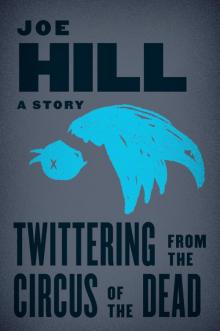 Twittering From the Circus of the Dead
Twittering From the Circus of the Dead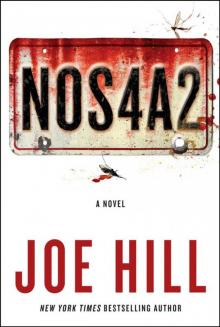 Nos4a2
Nos4a2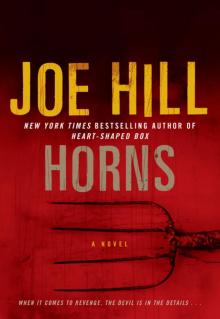 Horns
Horns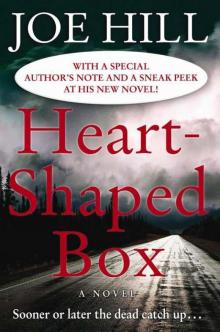 Heart-Shaped Box
Heart-Shaped Box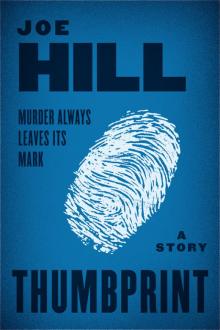 Thumbprint: A Story
Thumbprint: A Story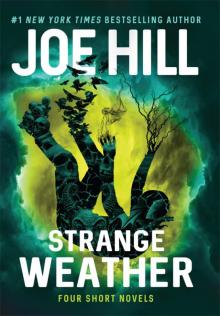 Strange Weather
Strange Weather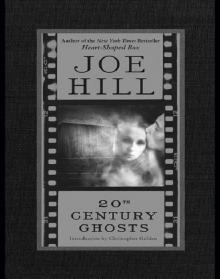 20th Century Ghosts
20th Century Ghosts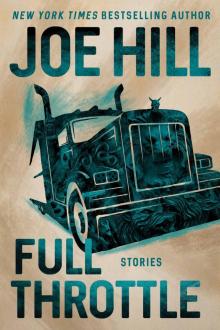 Full Throttle
Full Throttle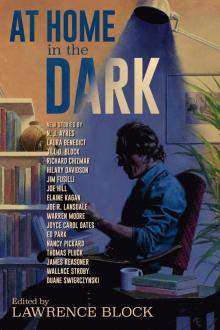 At Home in the Dark
At Home in the Dark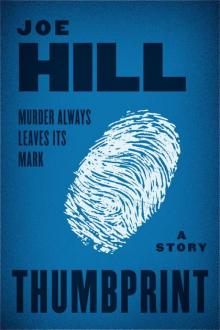 Thumbprint
Thumbprint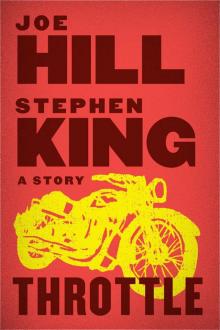 Throttle
Throttle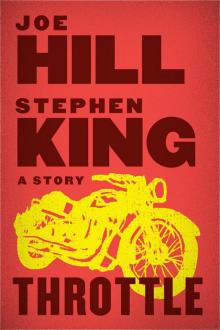 Throttle (Kindle Single)
Throttle (Kindle Single)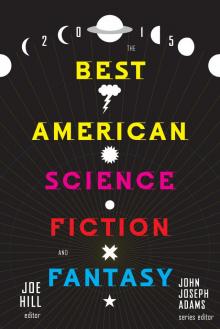 The Best American Science Fiction and Fantasy 2015
The Best American Science Fiction and Fantasy 2015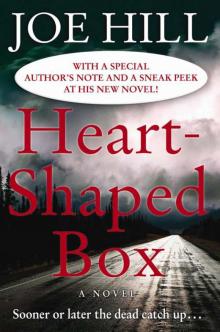 Heart-Shaped Box with Bonus Material
Heart-Shaped Box with Bonus Material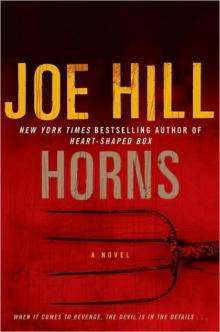 Horns: A Novel
Horns: A Novel